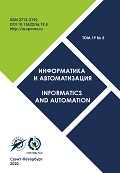Эффективность освоения современных информационных технологий и психологическая защита
Аннотация
В данной статье анализируется воздействие, которое психологическая защита оказывает на усвоение современных информационных технологий. Рассматриваются различные типы людей с преобладанием определенного вида психологической защиты. Даются рекомендации по превенции усиления психологической защиты при освоении новейших информационных технологий.Литература
Бассин Ф.В., Бурлакова М.К., Волков В.Н. Проблема психологической защиты // Психологический журнал. 1988. Т. 9, № 3. С. 78–86.
Грановская Р.М., Березная И.Л. Интуиция и искусственный интеллект. Л., 1991. 270 с.
Мельников В.М., Ямпольский Л.Т. Введение в экспериментальную психологию личности. М., 1985. 319 с.
Психология: Словарь / Под ред. А.В. Петровского, М.Г. Ярошевского. М., 1990. 494 с.
Романова Е.С., Гребенников Л.Р. Механизмы психологической защиты. Генезис. Функционирование. Диагностика. Мытищи, 1996. 139 с.
Тулупьев А.Л., Мусинова Е.В., Григорьева А.И., Тишков А.В. Базовое программное обеспечение персонального компьютера. MS Windows 2000 и утилиты. Интенсивный вводный курс. (Лабораторные работы и контрольные вопросы): Учебно-методическое пособие. СПб.: СПИИРАН, 2000. 110 с.
Тулупьева Т.В. Психологическая защита и особенности личности в период ранней юности. — СПб., Изд-во С-Петерб. ун-та. 2000. — 92 с.
Plutchik R., Kellerman H., Conte H.R. A structural theory of ego defenses and emotions // Emotions in personality and psychopatology / Ed. by C.E. Izard. New York, 1979. P.229–257.
Грановская Р.М., Березная И.Л. Интуиция и искусственный интеллект. Л., 1991. 270 с.
Мельников В.М., Ямпольский Л.Т. Введение в экспериментальную психологию личности. М., 1985. 319 с.
Психология: Словарь / Под ред. А.В. Петровского, М.Г. Ярошевского. М., 1990. 494 с.
Романова Е.С., Гребенников Л.Р. Механизмы психологической защиты. Генезис. Функционирование. Диагностика. Мытищи, 1996. 139 с.
Тулупьев А.Л., Мусинова Е.В., Григорьева А.И., Тишков А.В. Базовое программное обеспечение персонального компьютера. MS Windows 2000 и утилиты. Интенсивный вводный курс. (Лабораторные работы и контрольные вопросы): Учебно-методическое пособие. СПб.: СПИИРАН, 2000. 110 с.
Тулупьева Т.В. Психологическая защита и особенности личности в период ранней юности. — СПб., Изд-во С-Петерб. ун-та. 2000. — 92 с.
Plutchik R., Kellerman H., Conte H.R. A structural theory of ego defenses and emotions // Emotions in personality and psychopatology / Ed. by C.E. Izard. New York, 1979. P.229–257.
Опубликован
2003-06-01
Как цитировать
Тулупьева,. (2003). Эффективность освоения современных информационных технологий и психологическая защита. Труды СПИИРАН, 3(1), 211-216. https://doi.org/10.15622/sp.1.23
Раздел
Статьи
Авторы, которые публикуются в данном журнале, соглашаются со следующими условиями:
Авторы сохраняют за собой авторские права на работу и передают журналу право первой публикации вместе с работой, одновременно лицензируя ее на условиях Creative Commons Attribution License, которая позволяет другим распространять данную работу с обязательным указанием авторства данной работы и ссылкой на оригинальную публикацию в этом журнале.
Авторы сохраняют право заключать отдельные, дополнительные контрактные соглашения на неэксклюзивное распространение версии работы, опубликованной этим журналом (например, разместить ее в университетском хранилище или опубликовать ее в книге), со ссылкой на оригинальную публикацию в этом журнале.
Авторам разрешается размещать их работу в сети Интернет (например, в университетском хранилище или на их персональном веб-сайте) до и во время процесса рассмотрения ее данным журналом, так как это может привести к продуктивному обсуждению, а также к большему количеству ссылок на данную опубликованную работу (Смотри The Effect of Open Access).






